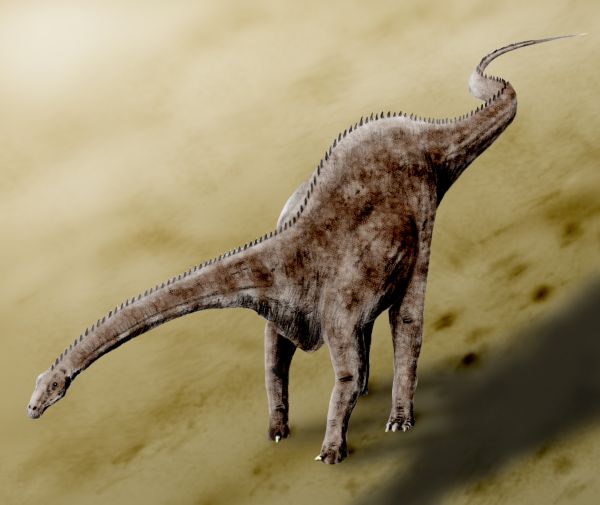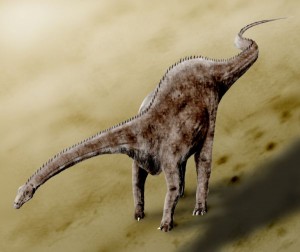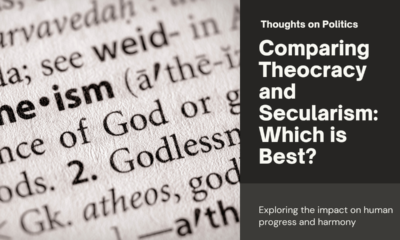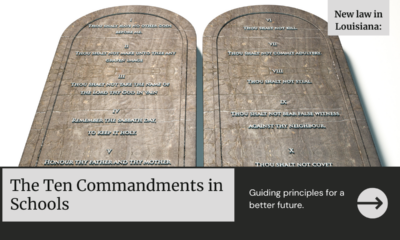Creation Corner
Creation Day 6: Creatures Great and Small

On Creation Day 6, God made the land animals. This included one class of creature usually lost in translation: the dinosaur.
The dinosaur problem
Many creation advocates have a problem with dinosaurs—or so they think. They see no references to dinosaurs in the Bible. More than that, they cannot conceive that a creature that once grew to tremendous size was ever small enough, and lightweight enough, to ride in Noah’s Ark. And if dinosaurs did travel aboard the Ark, where are they today?
But the Bible does mention creatures that can only be dinosaurs. The poet Job knew of two of them. One, Leviathan, God made with the other creatures of the sea. The other, Behemoth, walked on land. From the detailed description that Job gives, Behemoth is not, as the Geneva and King James translators supposed, a hippopotamus. (Behemoth’s tail is as big around as a cedar trunk, and the hippo’s tail is much more slender.) Behemoth is either Diplodochus or Brachiosaurus.
Creation Day 6: What’s in a name?
But most scholars who have counted the number of times the Bible mentions dinosaurs, missed one. The name Behemoth is a plural form for Hebrew feminine nouns. The singular form is behemah. And this word appears in Genesis 1:24-25. In the New American Standard Bible, this reads:
Then God said, “Let the earth bring forth living creatures after their kind: cattle and creeping things and beasts of the earth after their kind”; and it was so. God made the beasts of the earth after their kind, and the cattle after their kind, and everything that creeps on the ground after its kind; and God saw that it was good.
But the Hebrew text uses the word behemah, which the New American Standard translators, like King James’ Royal Commission before them, rendered as cattle. But that word does not mean “cattle.” It means a very large animal, as opposed to the far smaller animals that “creep on the ground” (worms, insects, spiders, etc.).
And so the English text should read:
Now God commanded, “The earth [or The land] shall produce living creatures of all kinds: large animals, ground creepers, and other animals of the earth, of all kinds!” And so it came to be. God made all manner of animal kinds, large animals after their kinds, and ground creepers after their kinds. God deemed this good.
Meaning that God saw this as a finished work, the finish of a two-day process for creating all the animals that swam, flew, or walked on earth.
Now God was ready to make His most exacting and marvelous creature: man.
Related:
- Creation Day 5: Swimmers and flyers
- Creation Day 4: Age of the universe
- Creation Day 4: The Big Stretch
- Creation Day 3: The great planting
- Creation Day 3: Dry land
- Creation Day 2: Fire in water
- Creation Day 2: Firmament
- Creation Day 1: Light
[amazon_carousel widget_type=”ASINList” width=”500″ height=”250″ title=”” market_place=”US” shuffle_products=”True” show_border=”False” asin=”0890512760, 1878026097, 0875523382, 0743290313, 0890514119, 0890514410, 0932766412, 0061472794, 0895262002, 0685459039″ /]
Terry A. Hurlbut has been a student of politics, philosophy, and science for more than 35 years. He is a graduate of Yale College and has served as a physician-level laboratory administrator in a 250-bed community hospital. He also is a serious student of the Bible, is conversant in its two primary original languages, and has followed the creation-science movement closely since 1993.
-

 Executive4 days ago
Executive4 days agoSecret Service chief gets no solace
-

 Executive3 days ago
Executive3 days agoWaste of the Day: Louisville Taxpayers Pay Nearly $600,000 For Empty Building’s Maintenance, Security
-

 Guest Columns4 days ago
Guest Columns4 days agoFear Itself: Democrats’ Favorite Strategy Caused Their Current Chaos
-

 Executive3 days ago
Executive3 days agoWhere is Joe Biden – or Jill?
-

 Executive1 day ago
Executive1 day agoWaste of the Day: Throwback Thursday: Cities Used Crime Prevention Funds on Soccer Games, Paper Shredding
-

 Civilization4 days ago
Civilization4 days agoBuild Iron Dome in the United States To Prepare for Israel’s Worst Day
-

 Executive2 days ago
Executive2 days agoFacile and politically motivated suggestions
-

 Executive4 days ago
Executive4 days agoThe Emerging GOP Plan To Beat Kamala Harris
















“One, Leviathan, God made with the other creatures of the sea.”
Great, except for one minor detail. There were no aquatic dinosaurs. None. Whatever Leviathan was – and I think the fact that it was supposedly fire-breathing tells us it was a myth – it wasn’t a dinosaur.
“Behemoth’s tail is as big around as a cedar trunk”
I don’t know where you’re getting that from, but it certainly isn’t from the bible. Job 40:17 states that the animal MOVES its tail like a cedar, not that it’s the SIZE of a cedar.
So basically:
“But the Bible does mention creatures that can only be dinosaurs.”
No, it doesn’t.
“Behemoth is either Diplodochus or Brachiosaurus.”
Or perhaps – just randomly suggesting an animal with a long thick tail that may have been familiar to people in the Middle East – a Nile crocodile?
That would scarcely do justice to the Divine creative power, as I’m sure you know.
Whyever not? It’s a big impressive animal with a long massive tail. And unlike sauropods it actually existed in the Bronze Age Middle East.
However, men could capture this creature. None could capture Behemoth.
Actually I doubt very much that anyone at that level of development could capture a big crocodile. Some of them weigh over a ton. In any case there’s the issue of poetic licence to be taken into account.
A crocodile is a far more plausible candidate than a sauropod.
So you’re not a Monty Python fan then?
Not to the point of approving plagiarism, or tasteless parody, however well- or ill-attributed.
Really? I thought it was quite amusing, and you can’t deny that it’s as accurate as the original.
Accurate it might be, but it is still disrespectful.
I don’t see how. Naturally my position is that wasps, sqid, sharks and even bacteria are marvellous examples of evolution, but if I accept the ID position just for the sake of argument then a wasp is a very impressive piece of work. And what can I say about squid? I mean, jet-propelled stealth blobs? Frankly, cephalopods make mammals look pretty dull.
All those creatures are marvelous pieces of work—and I emphasize work. But the tone of that Monty Python piece was still disrespectful.
Humour is disrespectful by its very nature, Terry. I can honestly say that I’ve never laughed at an obsequious comedian. I’m a big supporter of the police, for example, but anyone who can’t laugh at the Not the Nine O’Clock News “Constable Savage” sketch has a heart of ice.
By the way, how do I do italics here? Using ALL CAPS as emphasis is a bit crude.
You could try to use HTML tags. But I won’t vouch for their functionality. I have certain editorial privileges that allow me to edit comments in an environment that allows HTML to function.
Well, there’s one way to find out.
Have you seen the Constable Savage sketch?
It works!
Thanks for that.
Actually, I thank you for testing HTML tags in the comment-reply field and showing that they actually work.
“This included one class of creature usually lost in translation: the dinosaur.”
Dinosaurs are not a class of creature, they are either their own order (“dinosauria”) or they are simply reptiles.
“Many creation advocates have a problem with dinosaurs—or so they think.”
Yeah, the problem is the existence of dinosaurs. The problem does not go away simply because you find it pertinent to reinterpret God’s Word with your thesaurus.
“But most scholars who have counted the number of times the Bible mentions dinosaurs, missed one.”
So God in his infinite power created thousands of enormous, sometimes meat-eating reptilian creatures to roam the earth and fly across the skies, but only thought to bring them up once in his Words, in a manner that could be interpreted any number of ways. He must not have thought much of his own creation.
“Meaning that God saw this as a finished work, the finish of a two-day process for creating all the animals that swam, flew, or walked on earth. Now God was ready to make His most exacting and marvelous creature: man.”
I brought this point up in another post but got no response, so I’ll state it again: Why would a being of infinite power and wisdom (not just great, but INFINITE and perfect according to the Bible) need to create anything in designated stages? How would his Work have a beginning, let alone a “finish”? Wouldn’t it just “be so” in a moment of time so brief it could not be measured by human perception? Why would God need to be “ready” to do anything? Does he prepare, question himself, or have to think things out? That doesn’t sound like a Supreme Being to me.
The Bible doesn’t mention microbial organisms, which are by far the dominant lifeforms on this planet. Where do those fit in with your creation story?
My guess: Creation Day Three.
You don’t really believe any of this, do you Terry? Come on. What you’re proposing in these “Creation” essays is far, FAR less believable than the concept of “nothing came from nothing” that your supporters so commonly reduce atheism to. You can’t believe nothing could come from nothing, but it’s totally believable that an invisible force created and is guiding the fate of all humans while letting most of them suffer and starve and die?
You don’t really believe that life came from non-life, do you? Through a process that does not occur today? Come on. I at least have an explanation that hangs together. You haven’t.
No, I don’t believe that. Most atheists don’t. We think that the origin of life remains a mystery and that ancient myths with flimsy, easily misinterpreted moral codes attached to them are poor substitutes for a real answer.
At least you have an explanation that hangs together? By what standards is this acceptable? Not those of science, not even your own God, who punished Eve for eating from the Tree of Knowledge. Meanwhile, you attempt to explain God’s plan using information culled from hundreds of years of NON-RELIGIOUS investigation, even though such an attempt would be denying God’s Will as I was made to understand it in my youth in Sunday School.
I could come up with my own explanation for anything, from the reason my milk expired a week early to the ultimate fate of the universe. If I’m wrong, what difference does it make? Having no answer and admitting as such is an act of humility, making one up to suit your needs and vigorously defending it in the face of all known information is close to madness.
Now come on, we all know that the reason the Bible doesn’t mention microbes is because people back then didnt know what they were. Its the same reason why the Bible doesn’t mention fungi. The fact of the matter is that were dealing with a book that was written thousands of years before modern science, and the people (yes, people) who wrote it had no way of knowing what it is that we do now about the world we reside in.
Let’s go back to Leviathan for a minute. How could Leviathan “only be a dinosaur” when no aquatic dinosaurs are known?
First, I don’t grant your premise.
Second, Leviathan was not truly aquatic, but marine.
What premise don’t you grant? As for “marine,” that doesn’t help. There weren’t any marine dinosaurs that we know of.
Hallo? What premise don’t you grant?
Take your pick. I definitely don’t grant your premise that there is no God. Everything else you say follows from that, so…
Somewhat evasive, Terry. What premise about Leviathan don’t you grant?
You don’t recognize a marine dinosaur. YYou don’t accept that Kronosaurus existed. I recognize the one, and accept the other. Your premise is the denial of these facts. That is the premise I reject.
“You don’t accept that Kronosaurus existed.”
Huh? Sure I do. We have fossils and everything. It’s not a dinosaur though. As for marine dinosaurs, OK, name one.
I just did. Kronosaurus. You evidently define the word dinosaur differently, and perhaps less broadly.
I define the word Dinosaur correctly; a member of the clade Dinosauria. That clade doesn’t include pliosaurs. Kronosaurus was not a dinosaur.
A semantic distinction, hence a distinction without a difference. You may if you wish state what “clade” Kronosaurus belongs to. It makes no difference to me.
Hardly a semantic difference. It’s disturbing that you would dismiss this difference, since it leaves a bad impression as to your scholarship on the matter. To effectively say ‘dinosaurs, plesiosaurs, whatever’ is like saying ‘birds, turtles, whatever’.
OK, let’s ignore cladistics; as a creationist you probably don’t accept it anyway. So we’ll stick with Linnaean taxonomy. Dinosaurs are part of the superorder Dinosauria. Pliosaurs, which includes Kronosaurus, were part of the superorder Sauropterygia. Kronosaurus was not a dinosaur by any definition you care to find.
Out of interest, why would you nominate Kronosaurus as Leviathan anyway? Just because it’s big, scary and lives in the water? If so, why not go for the Nile Crocodile? It’s just as big, just as scary, lives (mostly) in the water and actually existed in the Middle East in biblical times.
Hmm. To put it in terms more accessible to a pathologist: ‘sarcoma, carcinoma, whatever.’
So can we all agree that Kronosaurus wasn’t a dinosaur?
This is not a semantic issue; Kronosaurus was no more a dinosaur than a gecko is, and rather less than a chicken.
Since that scarcely matters, I’ll concede that point. But I don’t have to concede that Kronosaurus never existed, do I? And frankly I find it strange that the clade called Dinosauria excludes Kronosaurus.
“But I don’t have to concede that Kronosaurus never existed, do I?”
Of course not. It would be silly to say it never existed, as it clearly did.
“And frankly I find it strange that the clade called Dinosauria excludes Kronosaurus.”
Why? Pliosaurs weren’t dinosaurs. Kronosaurus was a pliosaur. It doesn’t seem strange at all. And remember, we’re not even talking cladistics here; this is just Linnaean taxonomy.
If it interests you, by the way, crocodiles are more closely related to dinosaurs than pliosaurs were. Crocodiles are archosaurids, just like dinosaurs are. Pliosaurs weren’t.
Terry, as interesting as the creation myth is, I’m curious to see that Genesis has two, conflicting – in terms of order – creation stories.
Gen 2:4 sets out a very different order of events. I also notice that the whole “Eve taken from Adam’s rib” comes from the second part, whereas in the first story (1:27) “So God created man in his own image, in the image of God created he him; male and female created he them.”
Now, I’ve always understood that women are supposed to be subservient to men, because of the whole “taken from a mere rib” thing, however, that comes from the second creation story, that totally contradicts the first, and which – apart from the rib thing – seems to be totally ignored.
If you’re basing creation on the first story, then the bit about Eve coming from Adam’s rib can’t be true.
What’s going on here?
The Annals of Adam do not set out a different order. Rather, they give greater detail.
Most people do not realize that Genesis is a collection of Annals:
The Annals of Creation (Genesis 1:1-2:4a)
The Annals of Adam (Genesis 2:4b-5:1a)
The Annals of Noah (Genesis 5:1b-6:9a)
The Annals of Shem, Ham and Japheth (Genesis 6:9b-10:1a)
And so on.
So: The Annals of Creation tell a broad brushstroke of a story. But when Adam tells his own story, he fills in a few more details, from his own perspective. Like the time he got the naming rights for all the animals. He didn’t need some “committee,” as the Oxford English Dictionary does, to decide what to call something!
Hang on… Adam didn’t even know what clothes were until he ate the apple. How did know how to write? And what did he write on? Also, I thought Moses wrote Genesis, so it’s hardly a first-hand account. To quote creation.com “This is the liberal/critical view which denies that Moses wrote Genesis to Deuteronomy.” and “Moses himself was both writer and editor of the Pentateuch, and these five books were composed by him in about 1400 BC , not by unknowns at the time of the Exile.”
Plus that doesn’t take into account that his version of events is totally different to the “Annals of Creation.” According to Adam, he was created before plants and animals. It sounds more like he made stuff up than “fills in a few more details.” Does that mean he’s wrong? And it doesn’t explain why we go with the “official” time line, but steal the bit about the rib from Adam’s – seemingly incorrect – story. That sounds like cherry picking to me. According to the official version, man and woman are created together.
He wrote his Annals toward the end of his life. The Annals of Adam are his memoirs.
Um… and how do we know that? Nowhere is that in the Bible. That seems like pure supposition.
The entire Bible is pure supposition (or, if you will, impure.)
The idea of a naked, 900-year-old Adam sitting on a log or something writing his “memoirs” (it’s confounding to imagine how he actually occupied himself all that time) made me chuckle. Was it all in long-hand? Where did he get the ink? Were there a lot of books around to teach him about grammar, punctuation, story structure? Were his kids like “Dad, no one’s going to publish anything that long.”
Did he run it by God first? “Listen, God, I know you’ve got this great book with me in it all planned out, but I’d really like to tell me own side of the story. Thanks.”
What language did Adam write? What alphabet did he use? Where did he get it from? Who taught him?
Writing didn’t srping out of the aether. It developed over time, over a long period of time – we can observe this easily from the archaeological record.
An individual did not invent writing then jot down an entire thesis. We can see early writing now, and we know it was originally simply a system of identifying people and goods, basic nouns (including personal names) and quantities indicated by number strokes and dots. These systems evolved over time into the first great literary traditions, but that took centuries of expansion and refinement of the early systems to achieve. Even in the obviously unworkable scenario of the first homo sapien spontaneously inventing writing (to inform who of what?), then all global writing systems would share a common ancestor – which they demonstrably do not.
Here’s a radical proposal for you: God created Adam whole, mature, and learned. Learned in a language. The language was Hebrew—or perhaps an Old High Hebrew. Hebrew is the most ancient language known, and the richest. While written language might “evolve,” spoken language devolves.
If I said that, your response would be “I reject your proposal.”
I think you’ll find Sumarian far predates Hebrew. In fact, given that nobody even knows where the Garden of Eden was, it’s a bit of a leap to assume Adam spoke Hebrew.
And if God created dam learned, why didn’t he know what clothes were?
In reading these articles Terry, I find that anytime you come across a logical obstacle, your answer is essentially “Well, God can do whatever he wants.” It’s a petty response that reduces debate to an impossibility. Why don’t you actually engage with the problems everyone is bringing up?
“While written language might “evolve,” spoken language devolves.”
I thought evolution was a myth? Why does it apply to artificial systems but not biological ones?
Well, I’ll tell you what: in reading the literature on evolution, I find that whenever evolutionists come across logical obstacles, they answer that Old Father Time can do whatever he wants, and that time will reveal the secrets of all origins. Including the origin of human speech. I defy anyone to show how human speech went from a few inarticulate grunts to a language as rich as Hebrew.
“Time will reveal the secret of all origins.”
If you mean that, when asked about the origin of life, your average scientist will say something like “We don’t know yet, but we might someday” then yes, that makes good enough sense for me. We’ve progressed an incredible amount in only a few hundred years but in that time we’ve realized how much we don’t actually know, and our eagerness to find out without the reductive nature of ancient myths is key.
Or maybe you mean that evolutionary thought supposes that, given enough time, everything we see around us could have occurred naturally and/or without the intervention of a higher power. You seem to think that’s difficult to believe, for whatever reason, but your replacement of that possibility with the nonsensical, magical myths of a single book is immeasurably more ridiculous.
“I defy anyone to show how human speech went from a few inarticulate grunts to a language as rich as Hebrew.”
Define “rich.” And I’m sure any linguist could help you out but since you’ve made up your mind that it’s an impossibility, why should they bother?
It’s really not time for evolution but generations. I recently read that is takes at least 24 million generations for a mouse sized mammal to evolve into an elephant sized mammal. This of course would be under the best optimal conditions.
That is also why it is easier to observe evolution in bacteria because you can get many generations in a short amount of time.
“and the richest”
Doesn’t that contradict the repeated claim that ancient Hebrew didn’t have separate words for “circle” and “sphere,” “day” and unknown period of time” etc? You can’t have it both ways; it’s either the richest language known (and I have to say that, comparing its vocabulary with any modern major European language, that seems very unlikely) or it’s primitive and we have to make allowances for its limitations. Not both.
“spoken language devolves”
Ha ha. No. Spoken language changes, but it certainly doesn’t devolve. Listen to someone like Winston Churchill or CHristopher Hitchens; they easily rival Lincoln or Cicero.
You know better than that. It starts with the next generation not using the cases properly. Then they drop them.
“Use proper English; you’re regarded as a freak!
“Oh, why can’t the English learn to speak!”
Rex Harrison, as Prof. Henry Higgins, in My Fair Lady
Are you actually quoting My Fair Lady to support your arguments? Like I said before, engage with the problems being presented. Fergus has made a valid point. Just because a language has changed over time does not mean it has “devolved” which would imply it is somehow weaker. All languages are effective in their time and place in terms of communicating ideas between speakers, otherwise they would not be used.
Whoops “dam” = Adam
[…] Creation Day 6: Creatures Great and Small […]
[…] Reprinted from Conservative News and Views This entry was posted in Apologetics by Terry Hurlbut. Bookmark the permalink. […]